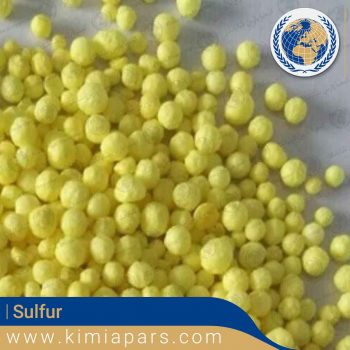Sulfur 99.5%
- Description
- Analysis of Sulfur
Description
Sulfur
Chemical Formula of sulfur: S
Other names: Sulphur
Appearance: Bright Yellow & Yellow
Usages:
- Sulfur is Used in Fireworks and Black Gunpowder .
- as a fungicide , fumigant , and in the vulcanization of rubber .
- in the manufacture of phosphate fertilizers .
- in the treatment of certain akin diseases .
- the most important compound is sulfuric acid .
- Other important compounds include Sulfurdioxide , used as a bleaching agent , disinfectant and refrigerant
Packaging: 25,30 Kgs bag , jambo bag 1 MT
Price: Negotiable, depending on the amount of the order
Payment terms: T/T 100% cash in advance
Min order: 1*20 ft. FCL
Delivery time: Within 5-10 days after we receive the payment
Origin: Iran
Sulfur, a non-metal element with the atomic number 16, is a naturally occurring substance that can be found in various forms on Earth. From being a crucial component in the creation of sulfuric acid to being a vital ingredient in the manufacturing of fertilizers, sulfur has been used in a multitude of industries for thousands of years. In this article, we will explore the various industrial uses of sulfur and the role it plays in our everyday lives.
First and foremost, sulfur is an essential element in the production of sulfuric acid, which is one of the most widely used chemicals in the world. Sulfuric acid is a strong and highly corrosive acid that is used in the production of fertilizers, detergents, dyes, and in the refining of petroleum products. The production of sulfuric acid begins with the burning of elemental sulfur, which creates sulfur dioxide (SO2). The sulfur dioxide is then transformed into sulfur trioxide (SO3) through a chemical reaction and the resulting sulfur trioxide is then combined with water to form sulfuric acid.
Another important use of sulfur in industry is in the production of fertilizers. Sulfur is an essential nutrient for plants and is therefore added to many types of fertilizers to improve crop yields. Sulfur-based fertilizers are especially important for crops grown in soil that is naturally low in sulfur, such as in many parts of Asia, Europe, and North America. These fertilizers help to increase the sulfur content of the soil and thus improve the growth and yield of crops.
In the rubber industry, sulfur is used as a vulcanizing agent. Vulcanization is the process of heating rubber with sulfur to make it more durable and resistant to heat and other environmental factors. This process makes the rubber more flexible and less brittle, allowing it to be used in a wider range of applications, such as in the manufacture of tires, hoses, and other rubber products.
Sulfur is also used in the production of detergents and other cleaning products. Sulfur-based compounds, such as sodium lauryl sulfate, are commonly used as surfactants in detergents and soaps. These compounds help to break down grease and oils, making it easier to remove dirt and grime from surfaces. In addition, sulfur-based compounds are also used as bleaching agents in the paper and pulp industry, helping to whiten paper and improve its quality.
The chemical industry also makes use of sulfur in the production of dyes, pigments, and other colorants. Sulfur-based compounds are used as intermediates in the production of a wide range of dyes, including aniline dyes, which are used in the production of textiles, leather, and other materials. Sulfur is also used in the production of pigments, such as titanium dioxide, which is used in the manufacture of paints, inks, and other products.
In the mining industry, sulfur is used in the extraction of metals such as copper, nickel, and zinc. Sulfuric acid is commonly used to dissolve metal sulfides, making it easier to extract the metals from the surrounding rock. This process is known as leaching and is widely used in the mining of minerals such as copper, nickel, and zinc.
Sulfur is also used in the production of batteries, as a component in the lead-acid batteries used in cars and other vehicles. Lead-acid batteries consist of a lead anode and a lead dioxide cathode, separated by a sulfuric acid electrolyte. The sulfuric acid reacts with the lead to produce lead sulfate, which then reacts with the lead dioxide to produce lead sulfate and water.
Sulfur usages
Fertilizers: Sulfur is a crucial component of fertilizers, as it is an essential nutrient for plants. Sulfur is often added to soil in the form of sulfuric acid or elemental sulfur to improve soil fertility and increase crop yields.
Rubber: Sulfur is used in the production of rubber, including natural rubber and synthetic rubber. Sulfur acts as a cross-linking agent, helping to bind the polymer chains in rubber and improve its strength and elasticity.
Chemicals: Sulfur is used as a raw material in the production of various chemicals, including sulfuric acid, sulfates, and sulfides. Sulfuric acid is one of the most widely produced and used chemicals in the world, with applications in the production of fertilizers, detergents, and other chemicals.
Oil Refining: Sulfur is a common impurity in crude oil, and its removal is an important step in the refining process. Sulfur is removed from crude oil through a process called desulfurization, which helps to improve the quality of the refined oil and reduce emissions of sulfur dioxide, a harmful air pollutant.
In conclusion, Sulfur is an important industrial chemical that has a wide range of uses, including fertilizers, rubber, chemicals, and oil refining. Its versatility and availability make it a valuable component of modern industry, and its proper use and handling are important to ensure a safe and sustainable future.
Sulfur Analysis |
| Content | Test Result |
|---|---|
| Purity | 99.5% Min |
| Ash | 0.25% Max |
| Hydrocarbon | 0.06% Max |
| Acidity | 0.03% Max |
| Moisture | 0.5% Max |
| Color | Yellow |

